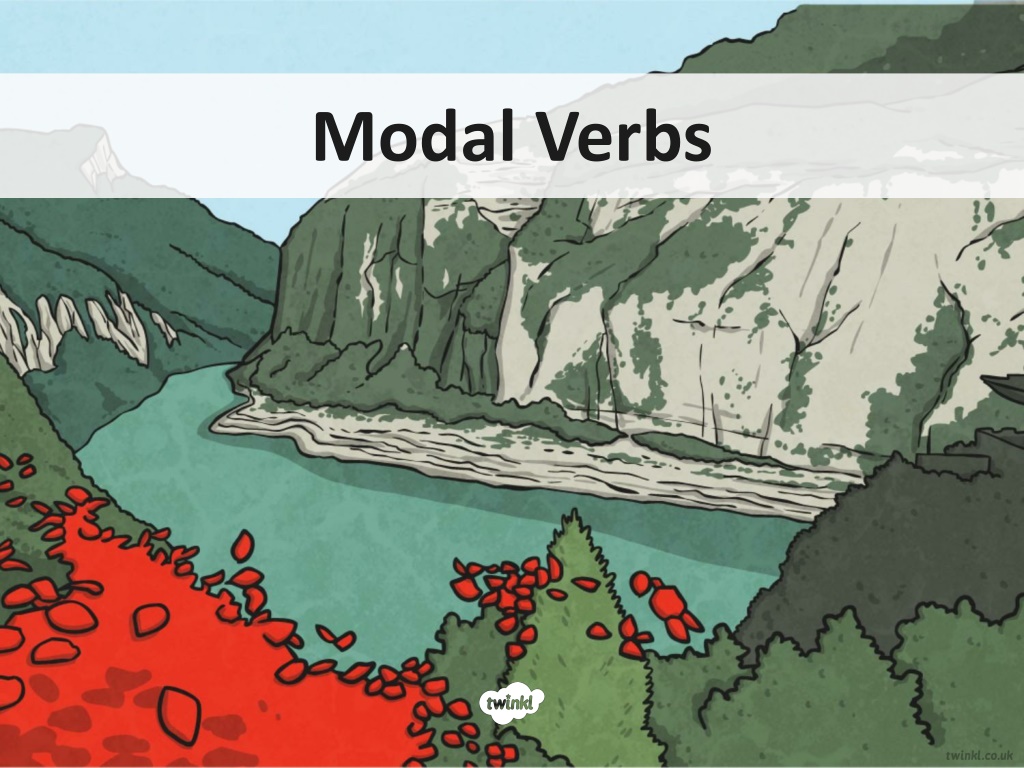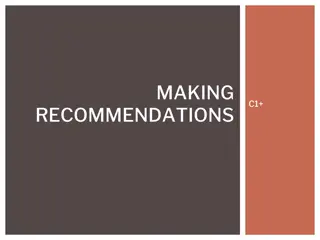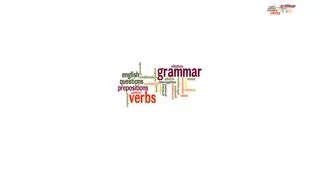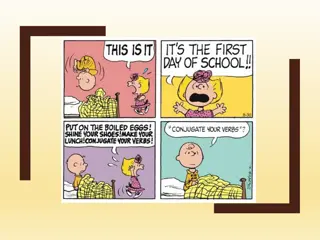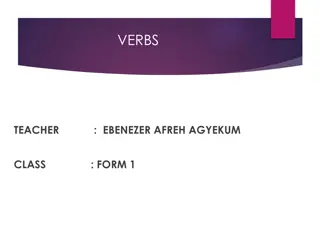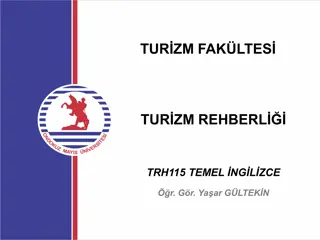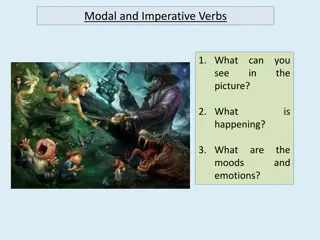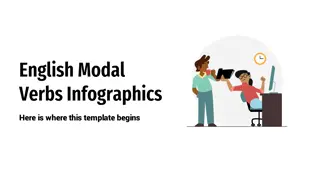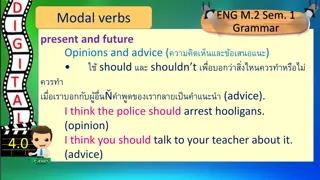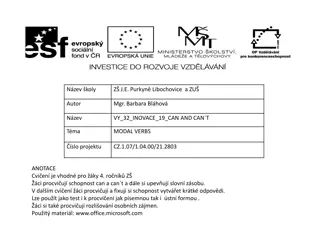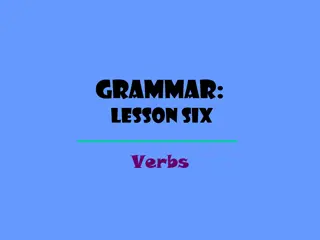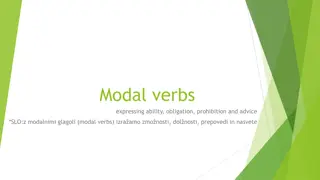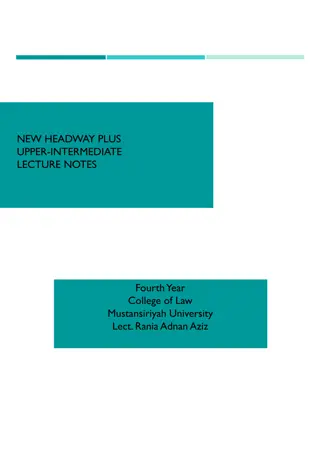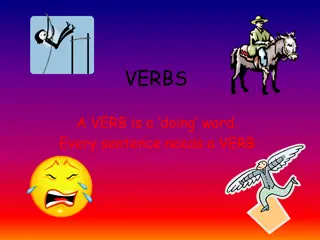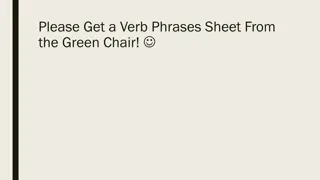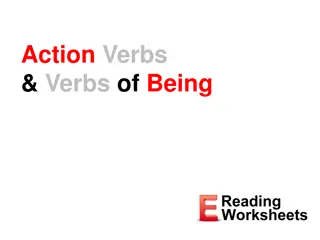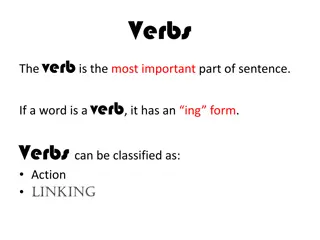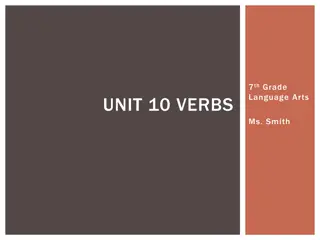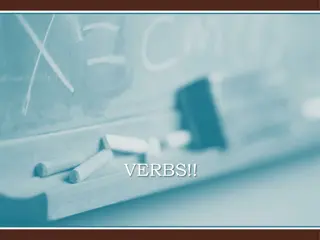Understanding Modal Verbs: Usage and Examples
Modal verbs are auxiliary verbs that are used in conjunction with main verbs to express various meanings such as possibility, likelihood, necessity, and more. Common modal verbs include may, must, could, should, and will. They play a crucial role in indicating the level of certainty or permission in sentences. This content provides insights into the rules and usage of modal verbs, including examples and scenarios where they are applied.
Download Presentation

Please find below an Image/Link to download the presentation.
The content on the website is provided AS IS for your information and personal use only. It may not be sold, licensed, or shared on other websites without obtaining consent from the author. Download presentation by click this link. If you encounter any issues during the download, it is possible that the publisher has removed the file from their server.
E N D
Presentation Transcript
Modal verbs are auxiliary verbs which cannot usually work alone. They are used with a main verb. These are modal verbs: might will should may would can could must shall oughtto
Modal Verbs for Possibility: The Rules Here are the most common modal verbs: may must would could might shall should can ought will You could also use the negative forms of these words as modal verbs, e.g. The frog might not become a prince. https://youtu.be/6wnjDkGYb1w
Modal Verbs for Possibility: The Rules Modal verbs usually come before a verb in its infinitive form. If I work hard, when I grow up I could be a doctor. could is the modal verb. be is the infinitive form of the verb to be . Infinitive means in its most basic form. In a few years, I shall earn a university degree. shall is the modal verb. earn is the infinitive form of the verb to earn .
Modal Verbs for Possibility: The Rules Modal verbs can have many uses. They are sometimes known as modal auxiliary verbs or just as modals . In most cases, they work with another verb to describe the possibility of something happening or to describe to what degree of certainty something is known. Look at these sentences that contain modal verbs: The rounders team could win the tournament. Humpty Dumpty will fall off the wall.
Modal verbs can be used to show how possible something is, or how likely it is to happen/have happened. For example: He s very late. He could have missed the train. It s snowing so it must be very cold outside. They will lock the windows when they go out.
Can you spot the Modal verbs used to show possibility in these sentences? Mum might take us swimming after school. might You could eat a banana instead of those sweets. could Hurry up! Hurry up! We will be late! said Dad will We can go the other way it s quicker. can Youought to go to bed earlier. ought
Modal verbs make questions by inversion. She can go out. Can she go out? Could we drive there? We could drive there. Children should eat fruit. Should children eat fruit?
Which Modal verbs are missing from these sentences? You be hot in that thick coat. Must If it s dry, we play outside? shall He s so fast, he win the race. should I m fed up with my long hair. I have it cut. might Did you choose these modal verbs? Which others could you have used?
We use should and ought to for giving advice. You should eat more fruit and vegetables. He shouldn t smoke. They ought to work harder. Must shows strong advice.
We use can and can't to talk about someone's skill or general abilities: She can speak several languages. He can swim like a fish. They can't dance very well
We use could and couldn't to talk about the past: She could speak several languages. They couldn't dance very well.
https://wordwall.net/resource/58890472/engli sh/modal-verbs
